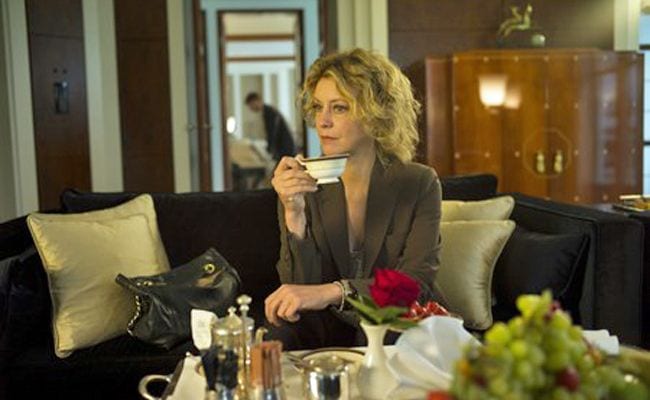
French philosopher Marc Augé has described the “non-place” as one people inhabit temporarily. Non-places like airports and hotels serve functions that are opposite of those served by homes, places where people might find safety or stability.
Irene (Margherita Buy) sees this opposition differently. In A Five Star Life, she works as a “mystery guest”, a secret customer at five-star hotels in order to write reviews of the service. As she visits elegant sites in Switzerland, Germany, France, and Morocco, her travel creates its own sort of stability. Irene’s satisfaction with her nomadic existence sets her at odds with her best friend and ex-lover, Andrea (Stefano Accorsi), as well as her sister Silvia (Fabrizia Sacchi). Andrea, owner of an organic produce company, and Silvia, a devoted wife and mother of two young daughters, have both rooted their lives in Italy. Still, the film goes on to show, all three experience some measure of loneliness and dislocation in their own ways.
A Five Star Life begins with the unzipping of a suitcase. Here Irene stores her evaluative tools, the white gloves she uses to check for dust, the thermometers to record the temperature of room service foods, and even a stopwatch to gauge the timeliness of room service deliveries. While you watch her inspection routines, Irene’s voiceover recites the criteria she considers, like “Does the hotel use a distinctive scent in the halls and rooms? Was the temperature suitable? Did the steward wish the guest a pleasant stay?” She uses these questions to assess degrees of comfort and care, how much a hotel might have felt “like home”.
The movie goes on to show that the “home” she might use for comparison is meager, short of furniture or comfort, impersonal. This much is laid out when she stays over for a night: she takes a beer from the fridge and proceeds to unpack her luggage, which is to say, she adds to her collection of hotel towels and complimentary toiletries. Then, she cooks up a pack of frozen spinach for dinner. A cut to a wide shot has her sitting at the counter, eating alone.
For all her apparent isolation, however, Irene insists that she feels fine—and so you know that she will be learning a life lesson. She spends her downtime with Andrea and Silvia. Returning from San Casciano dei Bagni in Italy, Irene visits Silvia for dinner. “Actually, I’m worried about your situation,” observes Silvia as they clean a head of lettuce together. “You don’t have a family, kids, a husband, not even a steady job. I wonder: what will Irene do 20 years from now? Who’ll take care of her?” (Her earnest concern hardly means that Silvia is wholly secure or undistracted in her own daily life: we see her parking her car where it will be towed and losing her keys more than once.) In response to her sister’s third-person queries, Irene has an answer ready: Silvia will have to look after her, and if that doesn’t happen, well, she points to her nieces in the other room.
Indeed, Irene presses, Silvia should worry about her own husband, Tomasso (Gianmarco Tognazzi), who is more than a little preoccupied with a digital farm-raising game. The tension between the sisters persists: Silvia notes the essential instability in Irene’s career choice, while Irene points out the mundaneness of Silvia’s home. As they debate, the women shuffle back and forth between the warmly lit kitchen and living room. The camera moves with them, conveying their different points of view, not taking a position, but instead suggesting each has reasons for her inability to see the other’s side.
Irene and Andrea’s stories are contrasted as well. During Irene’s sojourn at a Moroccan hotel, her solitary routine is intercut with images of Andrea back home, as he accompanies his new girlfriend, Fabiana (Alessia Barela), to a gynecologist. Andrea and Fabiana had one date, during which she became pregnant. While Irene appears in a sunny wide shot, reclining on a gigantic futon as she reads a book by the pool, Andrea stands awkwardly against the wall of an examination room, waiting for Fabiana, who is receiving an ultrasound. Cut to Irene smoking a cigarette on a rooftop overlooking a glorious sunset, then back to Andrea sitting with Fabiana, listening to the doctor suggesting a prenatal yoga class.
Both these scenes show hopeful, even beautiful scenarios, exotic scenery and the creation of new life. Irene continues to spend time in picturesque non-places, while Andrea re-evaluates what it means to have a family and a home. Despite being miles apart, they experience similar feelings of wonder and joy, reinforcing (obviously) the film’s point, that quality of life is a matter of individual interpretation.
And so, A Five Star Life has Irene articulate just that sentiment. En route to China for a vacation, she steps onto a moving airport walkway as we hear her voiceover again: “Would you recommend it [the hotel] to others, even if you have felt at times uncomfortable or lonely? … It is well to keep in mind, however, that happiness and wellbeing are strictly personal concepts. For some people, the sense of freedom and adventure is an essential part of the experience.” Her assessment isn’t subtle, but for this moment, the non-place looks and sounds enormously appealing.


![Call for Papers: All Things Reconsidered [MUSIC] May-August 2024](https://www.popmatters.com/wp-content/uploads/2024/04/all-things-reconsidered-call-music-may-2024-720x380.jpg)



